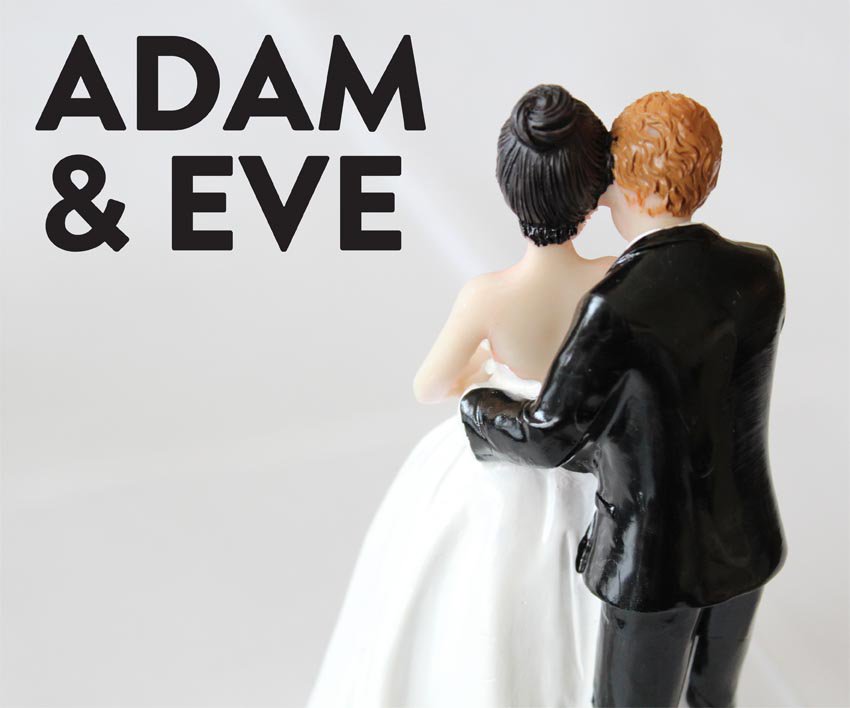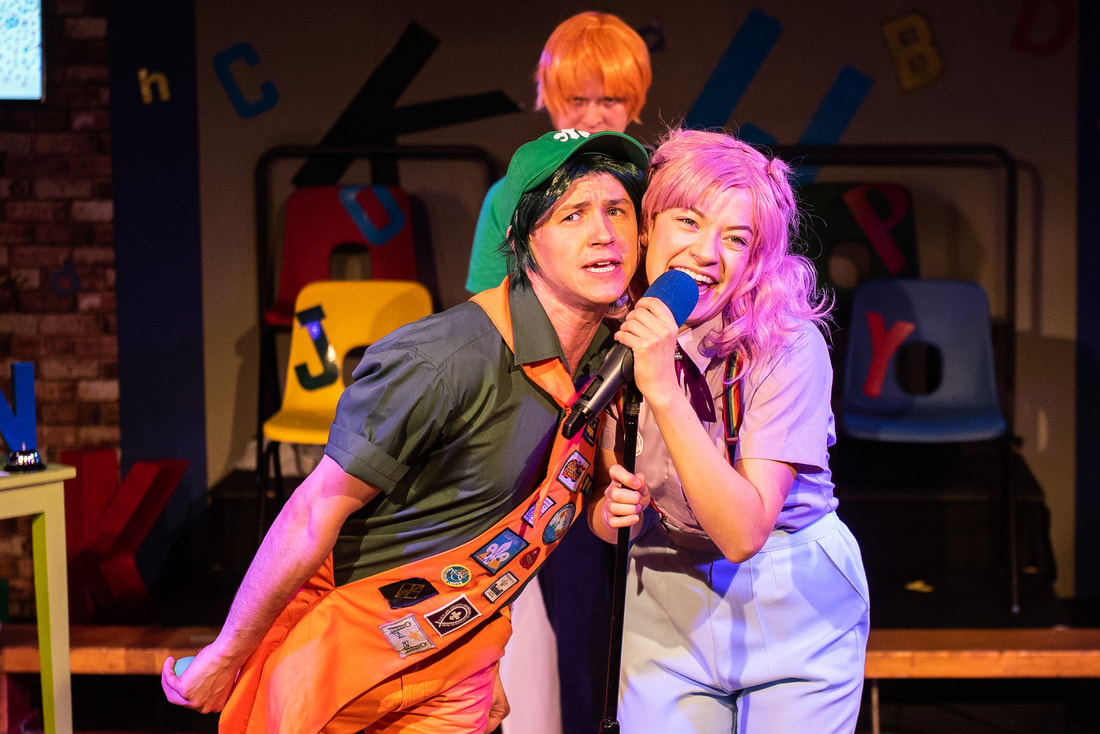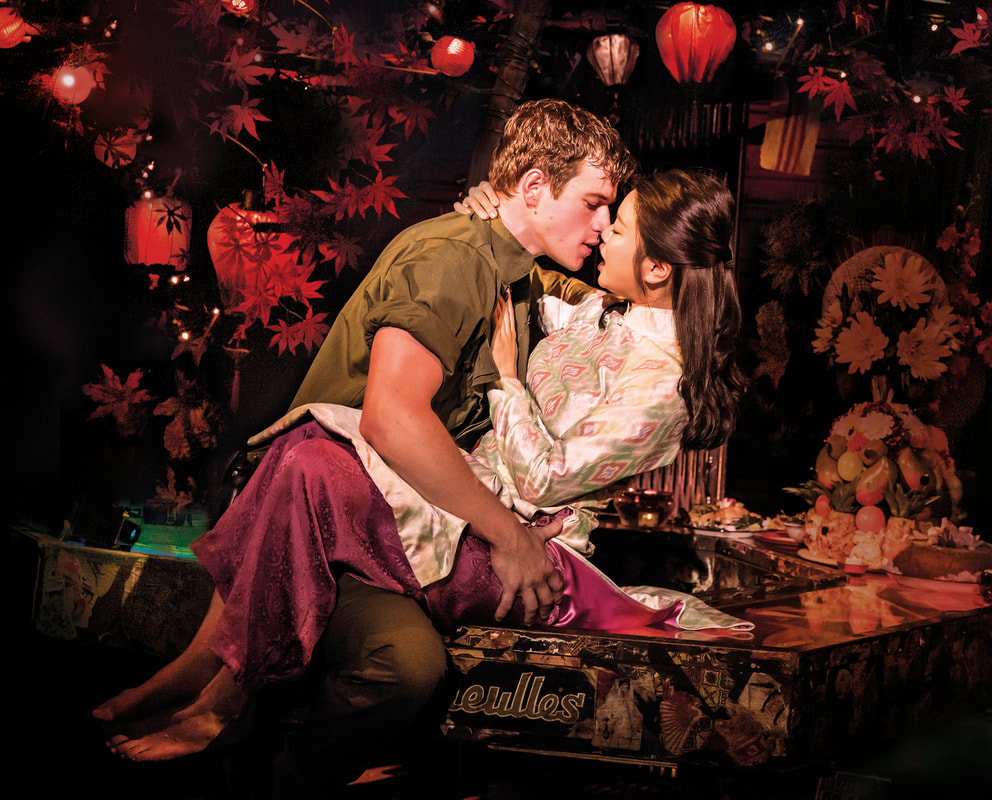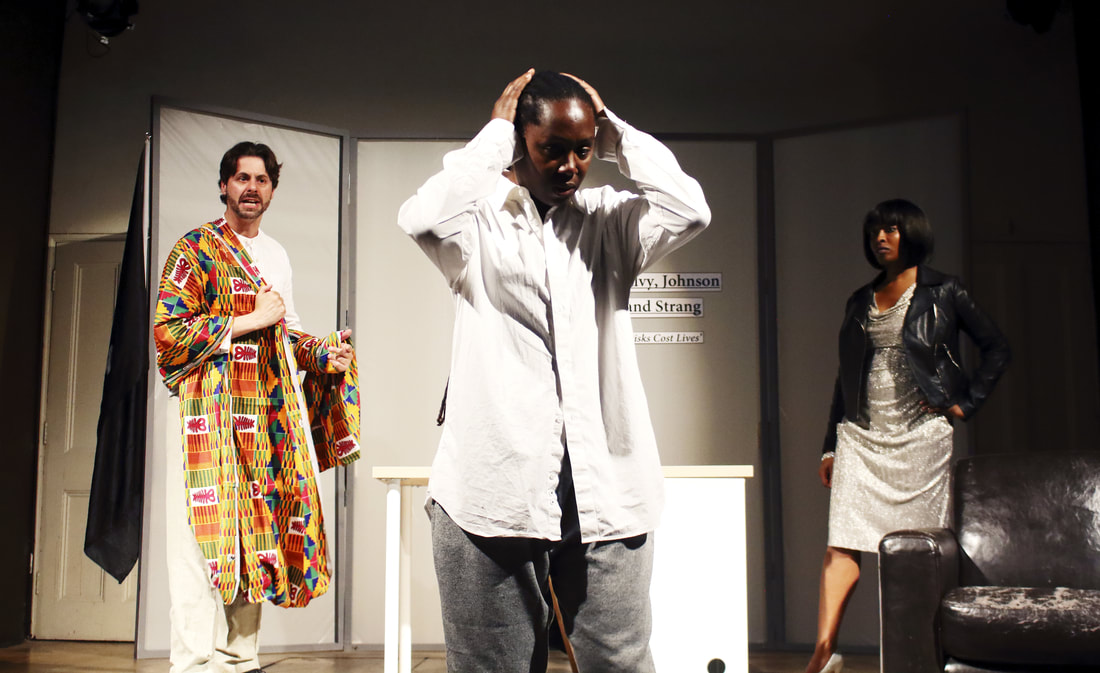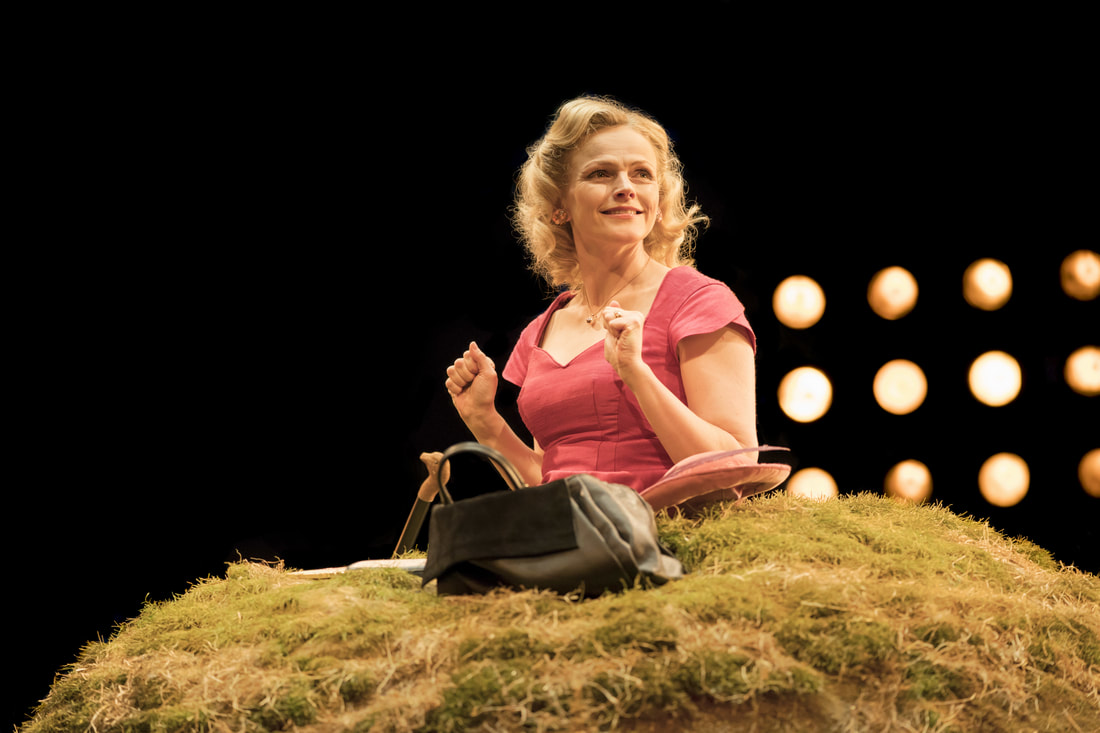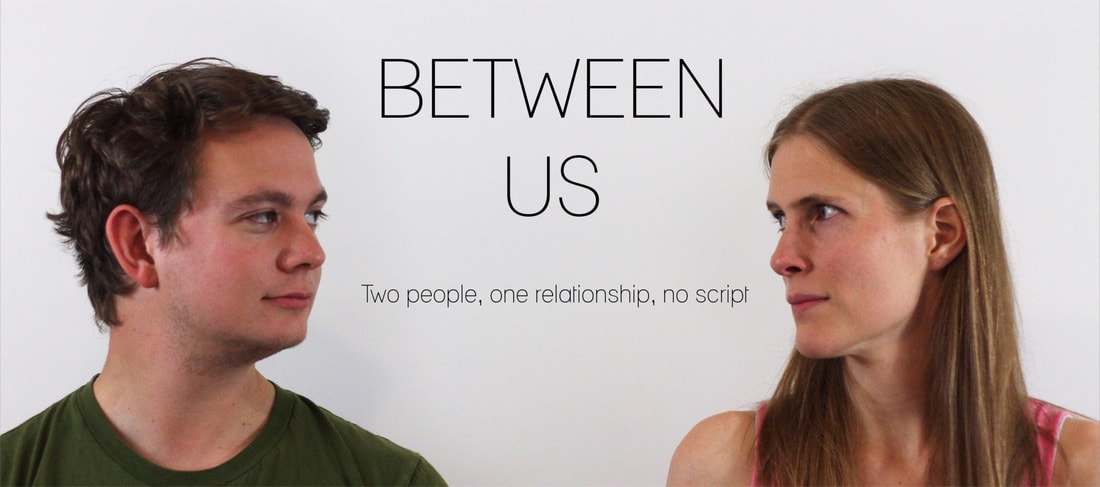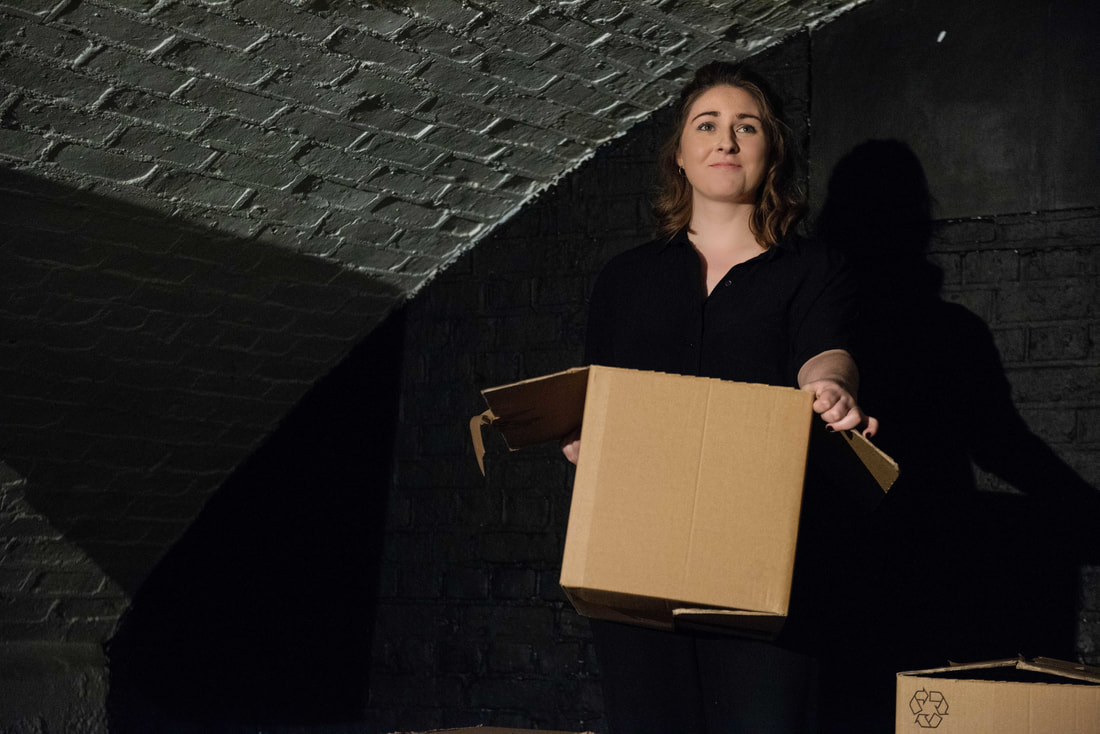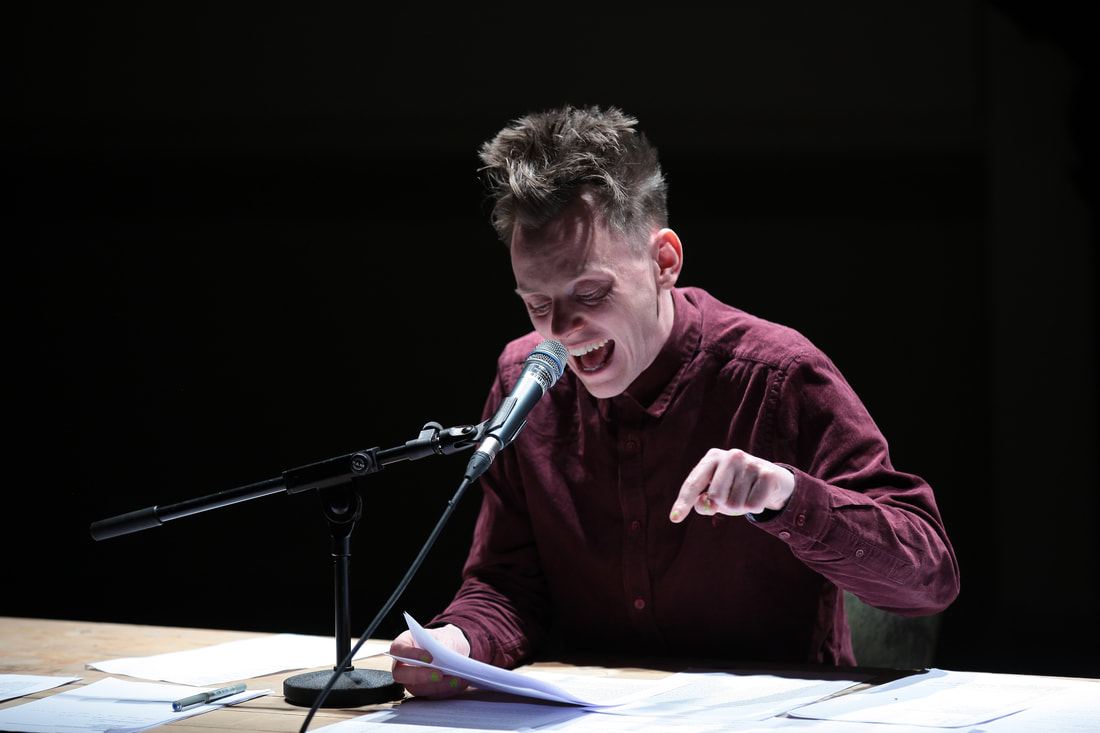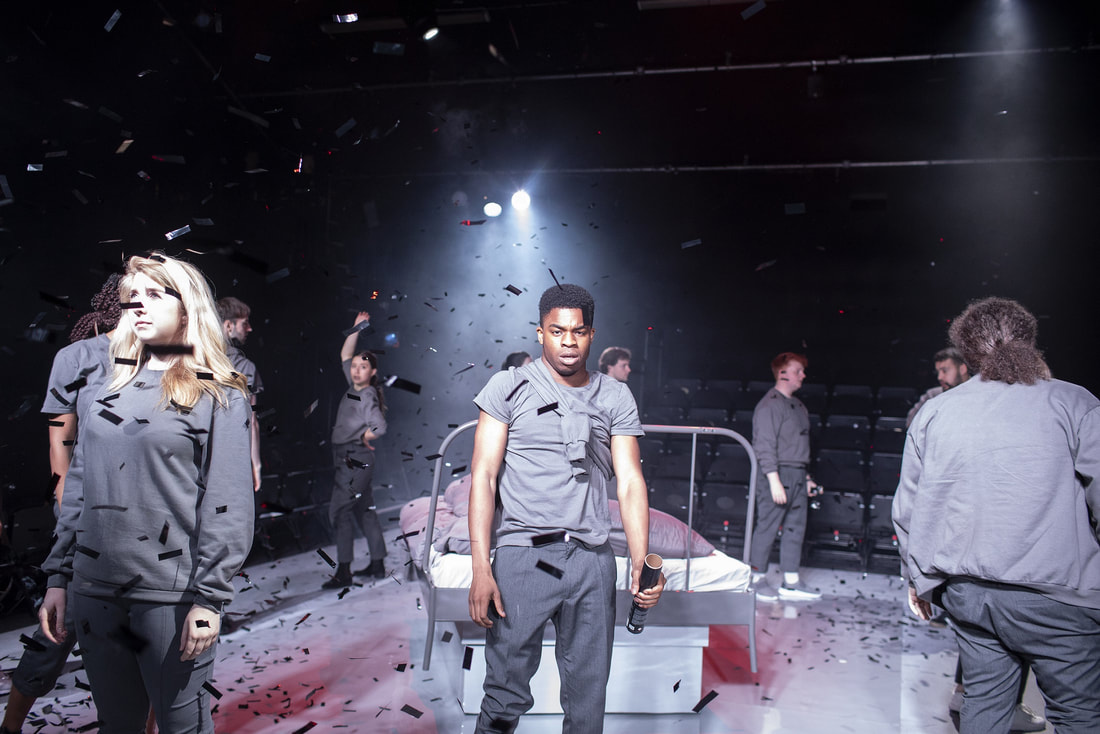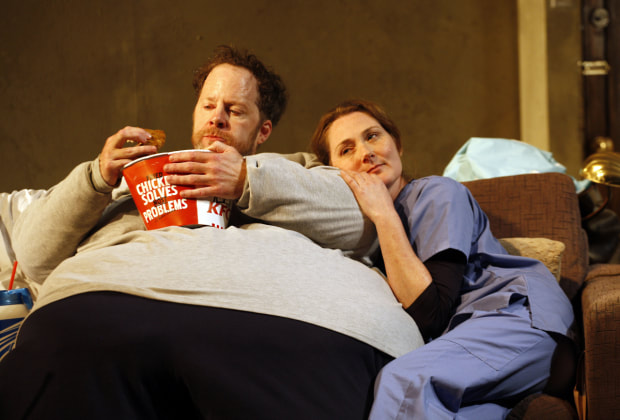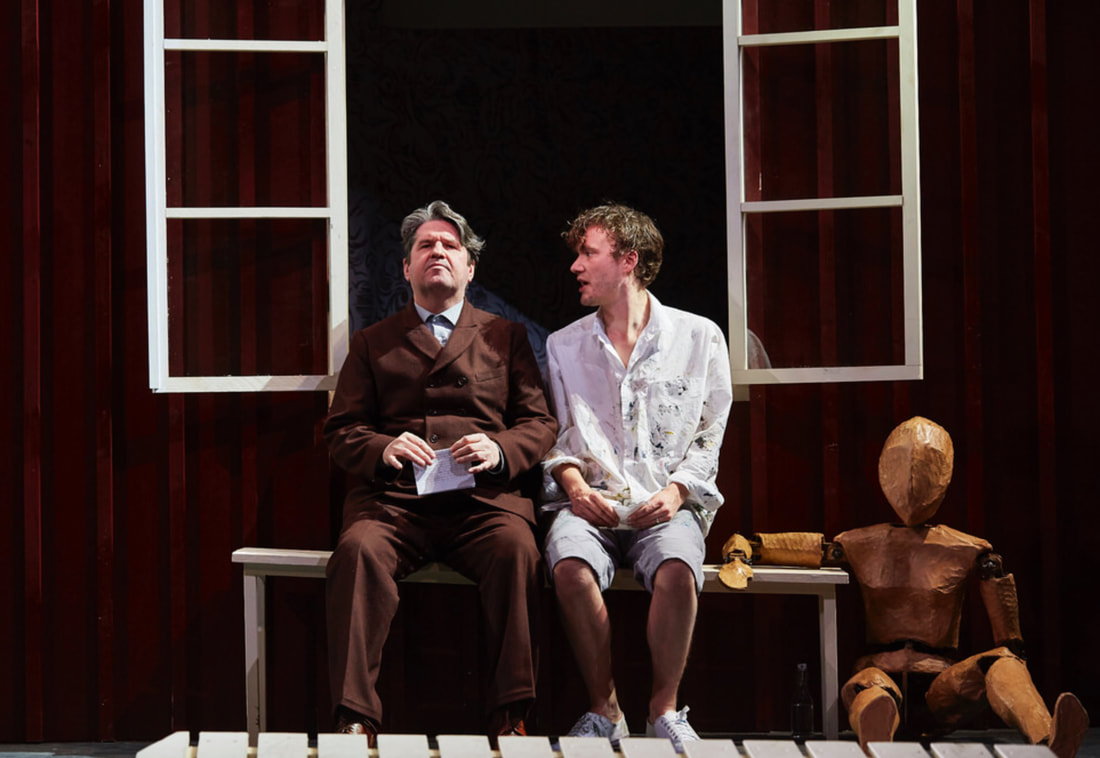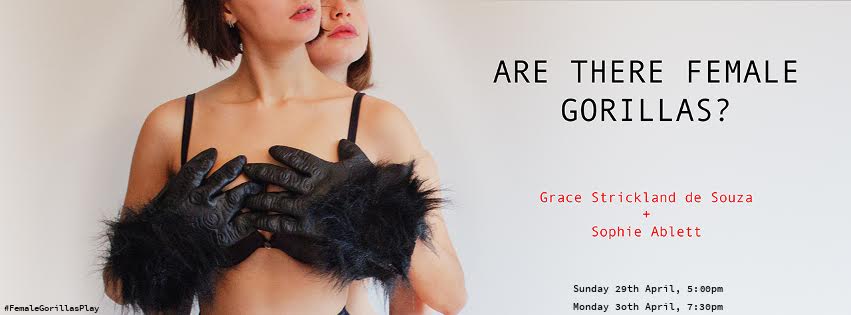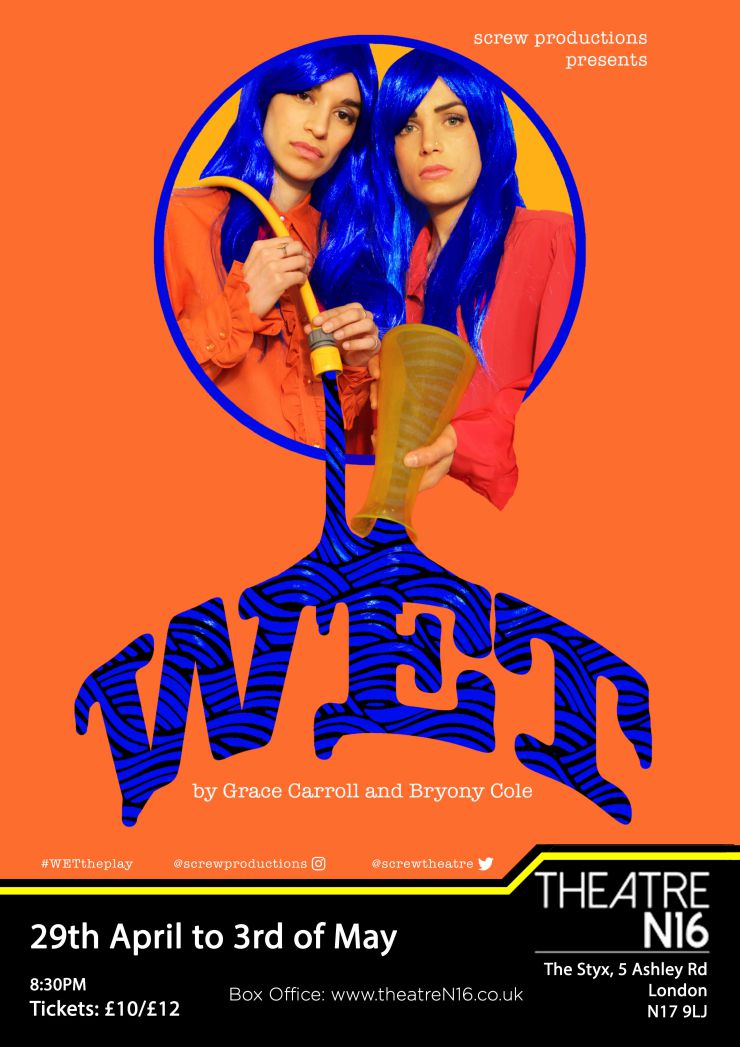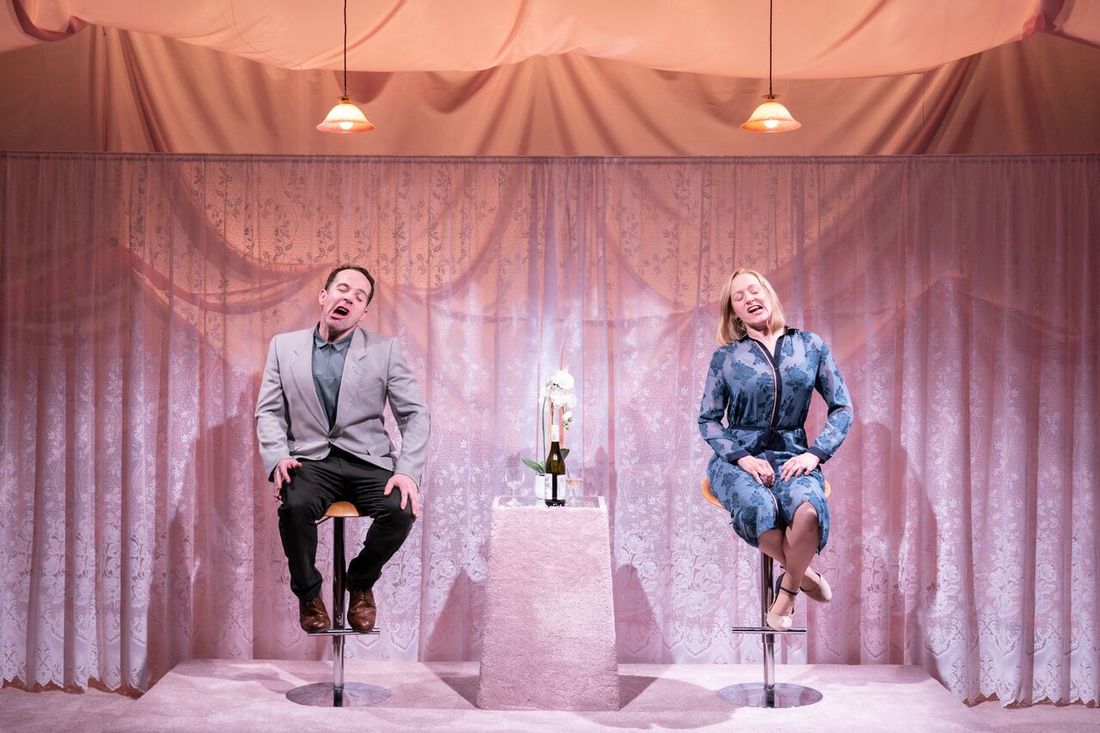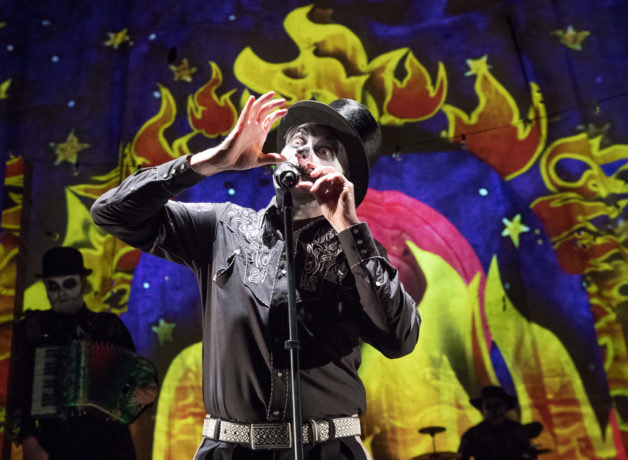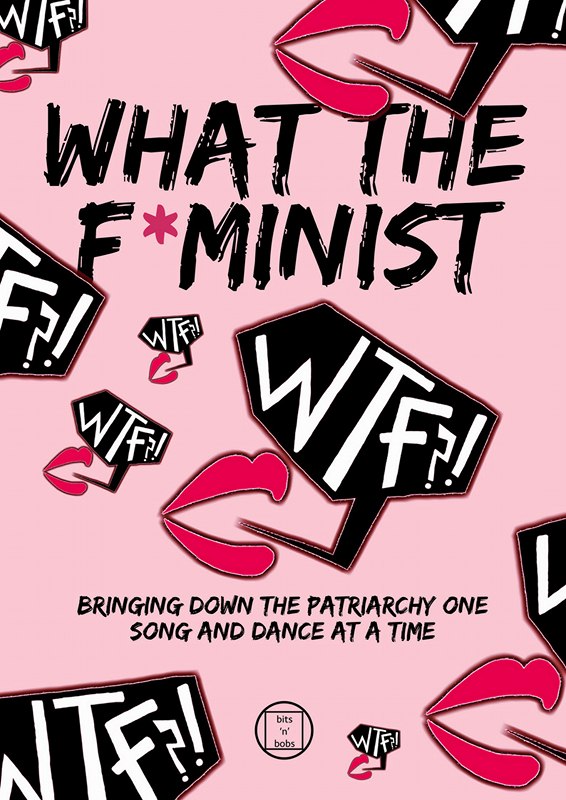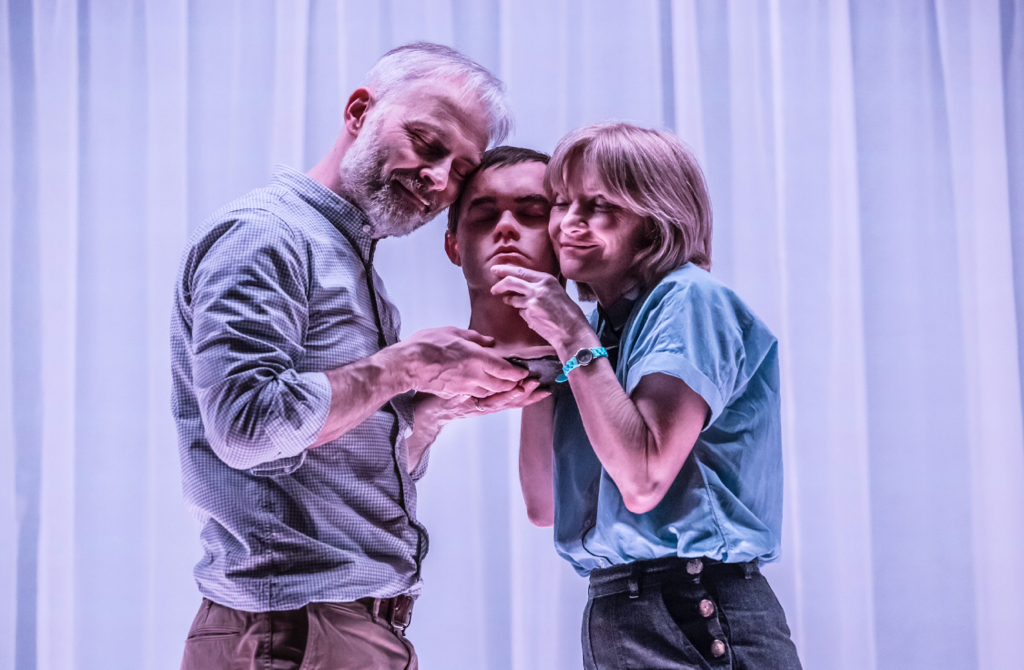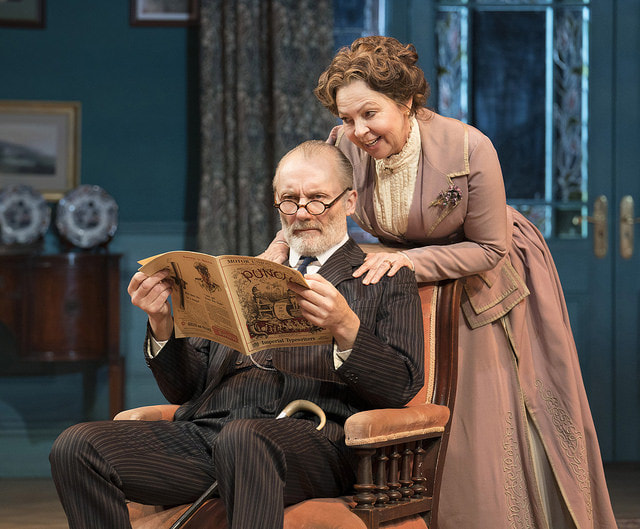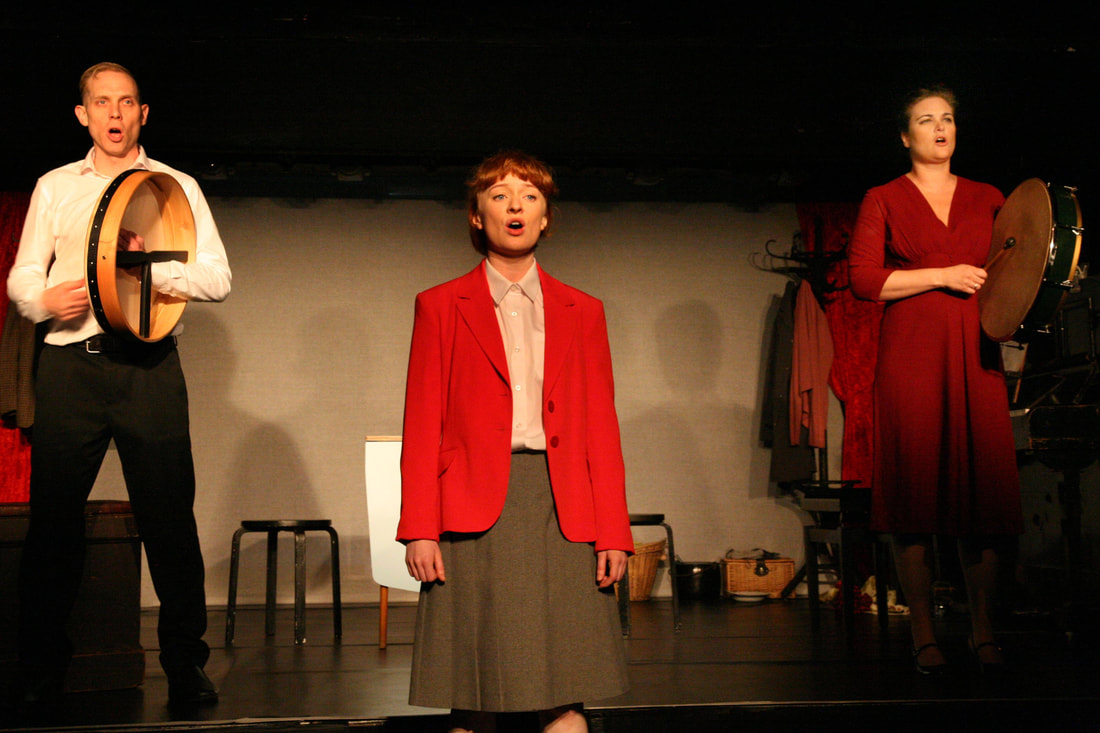|
‘His name was Adam. Her name was Eve.’ Sounds like it was meant to be. Adam and Eve starts as a story of high school sweethearts who made it through, got married and a mortgage. Everything was going according to plan. Until it didn't. Adam and Eve is a story of love, trust and whether there is a limit to the two. The production is expertly staged int he round with minimal set. The only stationary setpiece is a gorgeous paper sculpture in the ceiling and captured the eye upon entrance. The lighting design by Ben Jacobs fits the production perfectly and the lights at the beginning of the show are nothing short of a work of art. The cast does a good job with the text, although at the start of the play it is hard to believe what brought these two polar opposites together and the cast does not convince me that there is an attraction there, to begin with. However as a married couple, Lee Knight in the role of Adam and Jeannie Dickinson in the role of Eve, are utterly believable.
They have hilarious inside jokes with each other and bicker in an endearing way. Melissa Parker also deserves a mention for a fantastic performance in the role of Nikki. She brings a mysterious quality to the character and manages to be completely convincing both as a vapid teenager and a cunning young woman. Adam and Eve is an interesting, thought-provoking piece of new work and, without wanting to give too much up about the plot, it is eerily appropriate in the modern age. Written by Disa Andersen
0 Comments
‘Am I If?’, written and performed by Bramble Wallace of Lunar Objects Theatre Company, is the thought-provoking ramblings of a twenty-something girl in a twenty first century world. After her best friend and flat mate Amber moves out without any explanation, 'Girl' is sacked from her job in a restaurant and struggles to hold it together. To make matters worse, her room is rudely invaded by creepy bed bugs. She also has the period from hell. Her mother’s solution: become a witch. Sometimes it’s better to listen to yourself, so 'Girl' finds her solace in the quiet, clean haven that is the launderette.
Wallace’s presence is electric and we are engaged from start to finish. The writing ranges from witty stand-up style to visceral spoken word, which simultaneously has me in tears and on the edge of my seat. Wallace carefully and cleverly addresses an array of issues that young people (particularly females) may come across when facing the big bad world, ranging from body hair, to obsessive career aspirations, to losing a best friend, and does so in a way that feels new and relevant. Wallace explores ‘expectation versus reality’, which gives us a relatable insight into 'Girl’s mindset, and is a clear through-line dotted throughout the piece. Wallace commands the stage effortlessly, and connects excellently with audience members to provide a responsive and communicative atmosphere. ‘Am I If?’ is a hilarious and evocative journey exploring female friendship and downright honest self-awareness. Written by Faye Butler We all love to win. But alas as the poet said ‘you can’t always get what you want’. The 25th Annual Putnam County Spelling Bee, perhaps the worlds longest name for a musical, is a story about not meeting expectations and growing through it. The 25th Annual Putnam County Spelling Bee did not meet my expectations, it far surpassed it. MKEC productions have managed to take this rather simple musical and add refinery to it.
The production stars colourful costumes, the highlight of whom are the whimsical wigs, and a matching set that is slightly reminiscent of Mathilda. The work also features projections and live streaming of certain moments in the play. Whilst I found the live streaming unnecessary the projections, showcasing correct spelling of words from the play, were enjoyable and a great addition to the suspense once the characters start attempting to spell ever longer and more difficult words. Added to all of this is also audience participation which normally I despise as it is often both tacky and terrifying for the audience. This particular case of audience participation was however handled very well, volunteers were prepped beforehand, after consenting to take part, so it only added to the enjoyment of the piece. The 9 strong ensemble does a fantastic job and it is impossible to pick anyone out of the crowd, they were all spectacular. It is rare to witness an ensemble that is so fine-tuned and polished as is the case with this production. Although it is perhaps not the most thought-provoking musical it is incredibly polished and an immense bag of fun. The Heat is On in Miss Saigon! An operatic epic inspired by a Puccini opera, Miss Saigon is visually and vocally spectacular: Madame Butterfly with bargirls and G.I.s, it tells the tragic tale of Kim and Chris, a romance grown and gutted by the violence of the Vietnam War.
Miss Saigon shares more than its music-makers with Les Misérables: from Schönberg’s motif-rich music to Boublil’s overlying lyrics, Miss Saigon is also sung-through, has a thieving entertainer who thrives on surviving – Red Concepción’s Engineer is magnetising – is thrillingly theatrical, and has the same thematic threat of revolution on intimate romance. Yet, far from a French revolution, the Fall of Saigon is a tragedy from only forty years ago: the effects are still felt, the wounds are still raw, and history still hasn’t verified the heroes and villains. The musical is mostly from the perspective of the American G.I.s, with Ashley Gilmour’s gorgeously-sung and agonised Chris at the forefront; it’s their view of Vietnam, their arguably amoral actions, and their misguided guilt that moves most of the plot, without always feeling authentic or appropriate. The contrasting openings of each act are key: in Act I, the Americans are cavorting with the Vietnamese women like corrupt kings – with the only cost to them what they’re willing to pay for the company, of course – yet, in Act II, they’re venerated veterans campaigning to recouple Amerasian children with the Americans who fathered them in Vietnam. It’s a magnificent piece for a male chorus, regally powered by Ryan O’Gorman’s John, but coupled with projections of real Vietnamese children and the tragedies of the first act, in places it feels more uncomfortable than touchingly genuine. It’s a feeling capitalised on later in the act as three white Americans – John, Chris, and Chris’s wife Ellen, a lovelorn Elana Martin – fight over the future of Kim and her son, as Kim sings to the side, alone. There is an argument that this is a critical view of Vietnam, but the musical has a controversial conception: the composers and most of the creative team are non-Asian, and some of the original principal cast, including Jonathan Pryce’s Engineer, wore prostheses to make them appear more Asian. This, coupled with the visual spectacles and vocal acrobatics that characterise the musical, magnificent though they are, often make it feel closer to glorification than appreciation. It’s not that Miss Saigon glorifies the G.I.s or vilifies the Vietnamese, but there’s something that feels vaguely uncomfortable about its appropriateness and authenticity. This touring revival aims to reclaim its authenticity: from the costumes, with all the G.I.s’ jackets once worn in action, and all the straw hats from Vietnam or Thailand, to the casting, with actors from 10 countries completing the 38-strong company. The musical may have an uncomfortable conception but the performances are conceived with passion, power, and empathy across the cast. Acielle Santos’s hard-bitten, battle-hardened Gigi begins the bargirls’ haunting hope with gravity and grit; Gerald Santos’s grave general Thuy is gorgeously-sung; and Red Concepción’s Engineer is a glorious, gluttonous antihero. Sooha Kim is a sympathetic Kim, but finds her power in her voice, as she grows from frightened orphan to protective mother. Gilmour is also somewhat sympathetic, although his character Chris is more pitying than empowering to Kim, but he captures the guilt-filled G.I. with grace, even if the peculiar plotting – there’s also an unannounced three-year gap in Act I, and a Nightmare to fill in the gulf in Act II – allows precious little time for him and Kim to fall in love. Other than the performances, the most impressive element of the musical is the spectacle: from the cinematic sets to the thrilling effects, the evocative lighting to the powerful choreography and fighting, it’s a visual, orchestral, and vocal feast. Miss Saigon may not be a perfect musical, but it’s impressive, powerful in places, and passionately performed – ‘The Heat is On in Saigon’! The 2007 economical crash and the following crisis in 2008 is perhaps the most influential event of the 21st century. Its effects were felt far beyond the world of bankers and brokers and Dare To Do sets out to describes this through the narration of Bear, a character loosely based on Kweku Adoboli, a trader who was jailed for his part in raking up huge losses. Dare To Do does a good job of describing a culturally diverse community, class differences between various neighborhoods and its effects on the inbetweeners, people like Bear who tread the grey line yet refuse to step down carefully.
The narrative structure is strong and fluid but the production falls short in several places The lighting design was painfully on the nose and the projections were at best unnecessary, at worst confusing. Many of the projections were out of synch with the action on the stage and were projected so high above the stage that the audience had to take their eyes off the action on the stage to follow what was happening in the projections. The set design felt lazy and the staging uninteresting. A redeeming quality for the production were the efforts of the actors who, set up to fight against the low energy of the production, often succeeded to a dazzling degree. Jaye-Ella Ruth does a great job with the wordy Bear and Rachel Summers commands the stage with her presence in the role of Melanie. Dare to Do is well written and stars a good ensemble of actors but the production could certainly be done in a more interesting way. Written by Disa Andersen Samuel Beckett's Happy days is a play revolving around Winnie, a woman in her 50’s. In Act 1 she is trapped to the waist in a mound, we then find her trapped up to her neck in Act 2. She is alone most of her time despite her partner Willie buried behind her in a hole. This middle age couple, who in some ways are very static with their relationship, are wholly committed to each other. The play is layered with subtext and emotion. It could be set in a kitchen or a living room and it would have the same relatable effect.
The set is comprised of a rotating mound centre stage which holds the two characters. Winnie is abruptly awoken in the morning by a loud ringing sound. She then catalogues items from her bag one by one digressing into reflections on language and meaning. The distortion of the body goes from physical to metaphorical, heads float, mouths utter words. This style is typical of Beckett, the imagery he creates within the play, bodies in pain, immobilised, paralysed, trapped is powerfully moving. But there are also moments of happiness within the ordinariness. The play looks at the positives of being in a long term relationship. It celebrates little details, like a simple acknowledgement of being heard. Maxine Peak is a breath of fresh air and such a precious talent. She carries the show from start to finish and embodies the character of Winnie beautifully. Although the situation of her character is not ideal, she takes pride in her appearance and appreciates every moment, every sound, every breath. She is truly transfixing as Winnie, and although we are sure she cannot move or go any where, we have no idea what she is going to do or say next. The play is a surrealist, naturalistic, existential piece of theatre. The couple who are completely opposite but somehow they work. It takes an ordinary couple in an ordinary situation and visually distorts it. A stylised piece that leaves you hanging on to every single word. Written by Rebecca Phillipson Improvisation duo Rachel Thorn and Alex Keen chat to the audience and pinch interesting character ideas to fuel their hour long improv set based around the highs and lows of being in love. In this particular case, we have Rachel the carpenter/musician, whilst Alex is some sort of barrister. From the get go, the scenes are dull and lack any real interesting conversation. The pair have no sense of giving or receiving and seem to be reacting on two completely different wavelengths. Thorn appears to be holding back laughter during the more serious scenes and the character she creates is tremendously unlikable, as she attempts to raise the stakes from zero to one hundred over the tiniest disagreement. Keen, although naturalistic, seems to be at a loss throughout.
The pace goes from slow, to laboured, to painful. Whilst the initial idea is intriguing, there needs to be far more to the piece to prevent it from just feeling like two people struggling to find words for an hour. No one wants to watch a vanilla couple live out a boring life. With a much shorter set and much higher stakes, Between Us might find it's place amongst the fringe theatre scene. Written by Faye Butler Devised and performed by Rachel Causer and directed by Georgie Straight, Lippy is a personal insight into Rachel's brain and her relationship with her own conscience. Surrounded by cardboard boxes, Causer listens intently to her own voice-over and almost performs as a double act (with herself) to progress the piece along. A lot of the material is relatable, and we hear all the existential fears a young woman may feel growing up in today's society, 'I'm 25... and that's the oldest I've ever been'. The writing explores subjects such as body image, peer pressure and the difficulties of being a woman in comedy, and does so in a way that is sweet, but doesn't necessarily raise any new points.
We move through her life with intermittent projections showcasing photos of Causer through the years, along with songs of the time. The piece comes to life when Causer carefully and precisely lip-syncs along to popular comedy sketches such as Amy Schumer and Sarah Pascoe, although one can't help but feel that this is purely because their material is so brilliant. The boxes are filled with screwed up paper and each time one is picked out, we hear the (often unwanted) opinions of friends or strangers in regards to the way Causer looks or acts. Although she is likeable and has bursts of funny moments, the piece in general lacks originality. With more pace changes and a shorter set, the piece could feel snappier and livelier. Written by @_FayeButler A one man show consisting of 90 minutes of monologue entitled Suicide Notes is a daunting prospect for any audience member, and a momentous task for a performer to undertake - let alone do well and keep the audience interested. Christopher Brett Bailey does just this, and takes the audience on a whirlwind journey through stories of sex, death and everything in between. Brett makes you laugh one moment then turn your judgemental eye inwards the next, and keeps the audience guessing as to which path we will venture down next, weaving between a palpable sense of awkwardness in the room and then being brought back together through conversational breaks and shared laughter between audience and performer.
Early in the performance, Brett warns the audience that the collected works he has to share lasts well over six hours, and his decision to share different parts of this in each performance is a savvy choice; the audience leave wanting more, and no doubt will be back on other nights to hear the rest, or purchase the book to read Brett’s other the stories. For this reviewer, the highlights of the piece are the very short stories that intersperse the longer sections. These are hilarious and shocking and leave the audience laughing – whilst surreptitiously checking around that they aren’t alone. No matter how funny or obscene the language is, the gravity of the topics presented in this show cannot be laughed away. Brett calls into focus the impact humans have on nature, what our attitudes towards having children really reveals about us and flips the discourse surrounding suicide on its head – or at least, that’s what this show looked out, you’ll have to come back another time to hear the rest. Written by @EmmaLamond23 The Fall returns to the off west end stage with a fresh cast – and fresh it is. A cool grey and blue palette greets me as I take my seat, with the tiered audience surrounding the stage. A double bed is centre stage prepared with grey sheets. The cold hues are cut with strobe and red glow as the young cast stride into the pit dressed in the same utilitarian grey as the set, but their clothes are the latest cuts, their shoes the latest brands giving them a ‘solid youth’ uniform. Hypnotic R & B plays as they dance staring at us in a Hakka-like manor, giving a youthful arrogance to the ensemble.
They finish with poses, bursting into cheers and ‘whoops’ and break from a group formation to the first Act, with a Boy (Niyi Akin) and a Girl (Jesse Bateson). They banter easily, batting back and forth playfully delivered dialogue. It’s clear from their interaction that they have enjoyed their rehearsal process, as they goad each other on. They take their cues for gear changes from one another, slipping into a serious resolve. Discussing the age of his grandmother Akin repeats ‘young at heart’, a phrase that is explored later. The scene is littered with the same impulses from the dance, giving a surreal energy transfer between the two. Act Two is stylistically less smooth, jolting through time with both positive an negative mile stones marked by strobe lighting. Two (Sophie Couch) guides the scene and pace with ease as she visibly grows more stressed with each passing time jolt. Although an interesting convention choice, it was unclear at time whether the actors are cued by the light, or if it is the reverse. As the jolts became more rapid, the pace falters. This scene is grounded by a constant movement of domesticity, as the actors make and unmake the central bed. They build a life, they make plans, then they’re stripped back. The bed has almost become another character, as the actors use it to reiterate the ebb and flow of life and death. Act three is a quartet, wonderfully punctuated by Jamie Ankrahs performance. Set in a dystopian care home, we follow A (Josie Charles) on her journey to the end. An effective convention choice is to have the actors play their ages as apposed to playing elderly, a directorial nod to the ‘young at heart’ idea constructed in Act one. The character B (Madeline Charlemange) gives voice to the plays central theme, the ageing population. She does so eloquently, and from the point of view of the older generation but with her own adolescent temper - helping the young audience see this debate with a new take. Within the scene the characters discuss ‘the option’ which is their way out of the overcrowded nursing home, sold by the emotionally distant Liaison, (Lucy Harvard). She comes and goes throughout the scene glued to her Perspex phone, the image of professional distance. She gives the role new meaning later as the façade slips and we see her become more human. Another performance worth mentioning is the heartbreaking softness of C (Jamie Foulkes). For such a youthful cast, it is impressive to see each of them truly appreciate what it would be like to be older and forgotten by their families. Foulkes talks of his characters past with honesty and depth that surpasses his years, and I am heartbroken by his exit. The scene moves on, and Charlemange leaves her new love, A (Josie Charles) on stage alone. Charles visibly retires into her character, allowing a sombre tone to settle in the room. She finds her resolve and opts for the ‘option’ and climbs onto the bed. It is then that I realise that throughout the play, the bed has only been manipulated when referencing death. A realisation that sends tingles down my spine as Charles delivers her final speech of youth from the bed. Beautifully Designed by Christopher Hone, the actors are free to stand out from this world of grey with just the lively dissection of the times one would hope for when watching the National Youth Theatre, an institution that prides itself on challenging the social constructs young people face in our society. Lead by an award winning Director Matt Harrison, this play will hit its stride and I’m sure the actors will carry on going from strength to strength, honing their blossoming raw talent. Written by @LeahG410 No man is an island, but many a man is marooned on one. Charlie’s island is his couch in Idaho, just about buoyant on a sea of abandoned bottles, and with little more than a laptop to save him from total isolation. With his work and relationships folding under his vast and ever-rising weight, Samuel D. Hunter’s The Whale is an odyssey to the very depths of love, loss, and faith.
A titanic, two-hour text with no interval, it’s one that’s alive with intertextuality and intellect. Revelatory in its palpable realism and its revealing plotting, it’s a play that never feels like it’s force-feeding us information from the past, but rather lets it unfold naturally as four visitors – loved ones and lost ones – pass through his living room. Everything bar the undulating waves in the intervening blackouts in Laurence Boswell’s production at Bath’s Ustinov Studio is naturalistic, from Tim Shortall’s dilapidated but detailed apartment set to the perspiration on Charlie’s brow under his ample padding, but those waves allow other whales, of the more emblematic breed, from Melville’s leviathans to the Bible’s behemoths, to bask below the dramatic tide. The literary – but literal – whales swimming past make the play’s title tough to swallow: is it a – grossly offensive – euphemism for the overweight, does it dehumanise, are we disgusted by the gargantuan? The play confronts our feelings and preconceptions about fatness fiercely but faithfully: Charlie’s estranged, unpredictable, terrifyingly sarcastic child, played with appropriate distaste by Rosie Sheehy, is openly repulsed, whereas a stranger – Oscar Batterham’s masterfully performed sympathetic Mormon on a mission – treats him with delicate tenderness – that is, until provoked into admitting his own well-disguised disgust. Charlie’s one lifeline is Liz, Ruth Gemmell’s fiercely frustrated but deeply frightened nurse, who even as his greatest defender is delivering Dr. Pepper to his fridge and edging him further and further to his inevitable death. These are complicated domestic politics, but they’re diplomatically explored, openly criticised, and respectfully performed. In the week we pass with Charlie, our feelings rise and fall with the waves: the wonderfully funny writing keeps us afloat, but every so often it forces us under the surface with devastating effect. Shuler Hensley is a heartfelt, hugely charming Charlie, and it’s in his unshakeable command of Hunter’s script that he can shake us with only a whisper of the inescapable: ‘I’m dying, Mary’, he confesses to his worried ex-wife, a troubled Teresa Banham who finds her escape at the bottom of a bottle. After all, we all have our vices, but what The Whale and wants us to find is faith, not in piety, or provisions, but in other people: affection and acceptance are our only saviours from those isolated islands where no man, not even an overweight one, deserves to be deserted. Written by @Leah_Tozer David Greig’s visceral rhetoric seldom fails to pack a punch and his adaptation of August Strindberg’s Creditors is no exception. Widely regarded as the 19th century playwright’s most mature work, his dissection of three wounded souls claws mercilessly at the perennial scab of toxic romance.
Director Stewart Laing’s charming set design may appear idyllic enough at first glance; however upon closer inspection there is a distinctly disjointed feel to this beach hut retreat. A murky backdrop of cracked hills looms above the angles of dangerously sloping boardwalks and wonky benches, all of which contribute to the atmosphere of instability and isolation. This eerie ambience is underscored by the pulsing heartbeat of the waves licking at the shoreline. Our story is punctuated with the natural soundscape of this lonely beach as Adolph (Edward Franklin), Gustav (Stuart McQuarrie) and Tekla (Adura Onashile) unravel in a desperate attempt to satiate their own carnal desires. A viscous battle of sexual psychology ensues as our characters each struggle to sustain their sense of self. Strindberg’s fear and fascination of women - in equal measure - is apparent from the outset. Whilst waiting for his wife’s return to their holiday beach hut, Adolph’s encounter with a mysterious stranger infects him with an unease which permeates his initial worship for her. Tekla’s absence is heavily felt when Gustav calls Adolph’s masculine role into question as he manipulates the younger man into a state of cursed indecision. Adolph moulds his latest work of art as they talk, a sculpture intended as the form of Tekla, creating a delightful parallel as he shapes his piece to his vision of perfection. Indeed, themes of hiding behind art and the exploration of public image vs private intimacy continue throughout, climaxing in a film noir streamed live from the cabin’s interior. The format’s nostalgic quality highlights the dreamy perception of ideal romance in jarring contrast with an uglier side of love. McQuarrie and Onashile handle this shift in medium with effortless precision, teasing the audience with occasional appearances at the window as they engage in a heart-chafing tug of war. Stewart McQuarrie’s portrayal of Gustav oozes with surreptitious cunning as he slithers his way deep into the psyche of the married couple. Ever the enchantress, Tekla’s vulnerability lies in her inability to resist fresh temptations, and Adura Onashile captures a fierce embodiment of Tekla’s domineering nature. However, it is Adolph’s boyish naivety and helpless infatuation that leaves us utterly devastated; Edward Franklin is electric as he executes his role with sparky finesse. One can’t help but notice that these people’s attempts to reach one another are much like trying to save a drowning man; once the struggle is exhausted, you’ll go down together eventually... Creditors is showing at the Lyceum Theatre, Edinburgh until 12th May. Written by @CatMcFarlane After shaving sore armpits for the third time that week, in my first year of university, I was blessed with a flashback of my former twelve year old self. I was shaving bare underarm skin. My cousin Abby told me girls shave their armpits, so I thought I'd get the ball rolling before the hair grew. Back at uni, I dropped the razor and continued on to an existential tirade to my boyfriend at the time; "Why do I shave my armpits? Why does the thought of growing my armpit hair scare me so much? Why does it maybe repulse me? Why does it seem unclean? Why have I always shaved them bare and never questioned it until now? Why does it seem ALL women shave their armpits? Why don't men shave their armpits?". Present day and I'm well on my way to feeling like a badass bitch with my underarm hair. Are There Female Gorillas? expertly explores the female body in an era of mainstream feminism, particularly focusing on female body hair and all these questions that surround it.
We are presented with two characters, Girl and Gorilla. Gorilla = body hair. The piece brilliantly borders on absurdist, as 'Girl' (Sophie Ablett) frantically searches for stray hairs with her magnifying glass and tweezers. Wild-eyed-banshee of a performer Ablett is one to watch out for. The energetic words seem to spill from deep within her gut with grounded yet visceral energy. The experimental piece is jam-packed with quirky ideas that layer the piece with depth, such as shaving a kiwi before eating it, providing thoughtful and fascinating visuals. Grace Strickland de Souza is playful and innocent in her portrayal of Gorilla, and provides a calm energy, although sometimes forces the emotion. Directed by Francesca Tennant, we are treated with gorilla facts throughout, and sadly learn that female gorillas are far less researched than males. But we also learn that female gorillas engage in homosexual intercourse for the fun of it, so it's not all bad news. The writing is slick and cleverly repeats particular phrases to hammer home the message. Are There Female Gorillas? sizzles with energy and is a relevant, punchy piece of theatre. Written by @_FayeButler Pornography is created for the male gaze. This is a fact, something that is wholly unfair, and an issue that Screw Productions aren’t going to take lying down. WET is two women’s journey through the myriad of porn, break ups and personal sexual discovery, and leaves the audience feeling hopeful for the future of feminist sexual gratification.
The success of this piece lies in the attention to detail and the creative choices made surrounding the set, props and costume. Throughout the piece, the actors dress in brightly coloured clothes, and this adds a sense of fun, and helps to rewrite the narrative around porn from something that has historically been seen as dark and sordid, and presents it instead as something unapologetic and fun, and it’s through this joyful style that the audience are able to relax into the narrative and engage with the story. Early on in the performance the failures of porn are dissected and shown to us through excellent use of comic narration and mime, and it is from this starting point that Screw Productions rebuild what porn - and sex more generally - should, and can, be. This use of comedy to explore the topic takes the edge off the awkwardness of it all and allows the audience into the dialogue in a non-exposing way. This is complemented by live sound effects and other technical elements, which bring yet another comic element to the piece. This decision also reinforces the underlying message that sex is a live act, and its success - or failure - is dependent on what happens in the moment, and that it doesn’t always happen in a picture perfect way, as so much mainstream porn would suggest. In any situation where an overtly feminist standpoint is critiquing a patriarchal norm, there is the opportunity for the message to be one of one-dimensional feminist success in a simplistic, good-versus-bad dialogue. This is a trap that WET does not fall into. Screw Productions navigate the complexities of sexual exploration in a way that does not shy away from the problematic decisions one character takes to explore their sexuality, but instead examines this through female to female disagreement - a refreshing change from women being shamed by men. The audience were vocal in their appreciation throughout theperformance, and it was heartening to be a part of the event. This production might not completely overhaul the creative decisions made in the majority of porn, but it will help you to remember that there is a whole other world of sexual liberation out there beyond the contents of Pornhub. Written by @EmmaLamond23 Hi-Lo Productions’s ‘Being Brahms’, written by Gail Louw, devised and developed with Paul Humpolitz, and directed and designed by John Burrows, is 80 minutes of one man’s pure desolation and torment. Andrew Wheaton plays Anton, an Austrian prisoner of both World Wars, trapped in the memory of his past and the man he has become as a result. Anton, somewhat schizophrenically, seeks comfort on his dark days its the persona of Viennese composer Johannes Brahms, a popular, generous and happy composer, a man in every way different from his doleful self. As a soldier who fought so hard to live in brief happiness, his story is panged with anguish and regret, a lifetime of chasing love and kindness; from a traumatic childhood to having a child of his own - the abused who became the abuser.
Set solely in the parameters of a dusk-pink carpeted bedroom, simply furnished with a bed, chair, mirror and gas fire, Burrows’ design is a world away from the artistic and once-passionate character which inhabits it. Wheaton brings a powerful, focused energy to the role, as well as an exquisite Austrian accent, and is a commanding and poignant presence in the bare space. Minus the first few minutes of silence which opened the performance, Anton’s stream of consciousness seemed to leap from one thought to the next; as an audience member, it would have been nice to take a a few seconds of stillness to reflect - his piteous life deserved few moments of empathy. The realisation that the man on stage was not Brahms himself, but conversing as two different people, didn’t hit until about half way through the performance, so perhaps a more worked differentiation would have been more compelling from the outset. Wheaton’s physicality was so striking; fragile and nervous, a 70 year old housebound shell of a man. Giving homage to Brahms himself, classic music was sprinkled in his memories, which offset the weight of his instability and self-destruction. As a first visit to a one-man performance, ‘Being Brahams’ could not have been a more heart-wrenching, absorbing piece of theatre. As a piece with so much sadness at it’s core, there is an overriding sense of fulfilment as a troubled soul finds peace before your eyes. Written by @Kat_Anderson1 Look, maybe it’s satire, maybe the irony got lost somewhere in the air between the performers and the audience, but the thesis of Anthony Neilson’s The Prudes seems pretty opaque to me: a middle aged white bloke looking at Weinstein, looking at #MeToo, turning to us and saying
"I know it needed to happen … but this is hard for us too, you know?" That doesn’t make the play inherently wrong (or right), but whether you hate it or love it is surely going to correlate to whether you find that statement obnoxious or important. Perhaps it’s neither, or you’re somewhere in the middle. No problem, enjoy the jokes. There’s an awkward boner straight out of a Judd Apatow movie, and a couple who even bicker about the theatrical tropes they exist in: ‘I thought we agreed the monologues were private’. Sophie Russell, as Jess, achieves David Brent-levels of loveable awkwardness in her desperate attempts at audience rapport. The design is hilariously over-the-top; all-pink, luxuriously carpeted, it’s a well-hung pizza delivery boy away from being the set of a 70s porno. Just make sure you don’t completely write the play off when it opens with the lazy cliché of people feeling awkward to R Kelly’s Bump n’ Grind (it’s a SEXY song and they’re NOT SEXY!!!) and then leans pretty hard on a reversal of gender stereotypes (SHE’s the one who wants sex and HE’s the one who doesn’t!!!). Maybe, like me, you’ll find yourself guiltily relating to Jonjo O’Niell’s James. He’s been impotent for fourteen months, racked with insecurity about the context of his sexual experiences, unable to say with any certainty whether his partners truly consented, or just relented. Dripping with sweat, he squints under the hot light of a self-conducted interrogation. The accusation: he has a dormant capability of committing sexual assault. The evidence: he’s a man in a society which spawned and celebrated Weinstein to the sound of Robin Thicke’s Blurred Lines. It’s clear that Jess truly loves him, he’s a good man and he shouldn’t worry. Sure, they can both be insensitive: she gives him an ultimatum of sex tonight or it’s over, and he frames a trauma in her past as a horror story, all darkness and flickering lamps. But in the absence of other contributing factors, the play seems to posit that this relationship is suffering unfairly as a direct consequence of #MeToo. It pities them. Sadly, this couple were better off before. The same week, I saw Ella Hickson’s The Writer at the Almeida. It’s a play so blisteringly angry with men that I left feeling the same heat in my cheeks as if I had been personally admonished. I was ashamed. I wanted to scrutinize my behaviour, to change it. I left The Prudes ashamed once again. But this time from admitting that maybe I would be better off not scrutinizing too much, not looking too closely. Not changing. When theatre provokes a response in you, it’s always worth consideration. But some responses are more useful in application than others. Written by @HGlead Broken is described as a spoken word play which, although accurate for any play, is initially confusing. Is this a rap/poetry style piece? The next spin off from Hamilton? It is rather a sweet and clever homage to The Bard himself with most of the text in rhyming couplets. Sprinkled with stolen lines from classic texts, it charts the love story of a man and woman who meet after he sneezes on the tube.
We begin at the end of their relationship and through stylised choreography and direction, we slowly learn of their demise despite a passionate and heated beginning. The text is riveting at times and is deftly handled by the two actors who have great comic timing. As ‘Girl’ Edie Newman is bold and fearless throughout and Matthew Lyon (also the writer) adds sensitivity to flesh out the character of ‘Boy’. The rhythmic pulse of the text is heightened and exploited for comedy effect most notably during the sex scene, with a delightful squeak of the bed as their metronome. Despite the clever witticisms and skilful interweaving of Shakespearean verse and contemporary slang, the characters needed more depth. Although Boy reveals his inner insecurities about performing in the bedroom and Girl relates the hardship of love, this piece barely scratches the surface of a relationship breakdown. Boy finds solace in the bottle which is brushed off as just something men do, and rather than challenging gender stereotypes this piece actually enforces them. The ‘boy meets girl’ narrative is difficult to reinvent and now more than ever we must scrutinise these familiar tropes. Lyon is clearly a talented writer and I would be interested to see him tackle a different story with his modern pentameter. Written by @SAnnakin99 Directed by visual artist Mark Holthusen, Corrido De Le Sangre is a 90-minute musical rendition of the story of a Corrido singer and his band, shot dead by a drug lord in Mexico who now, on the day of the dead, have returned to the land of the living to haunt their killer and tell their story. The story is one of darkness and sadness and at times of bitter black humour. But most strikingly the band tell a tale of immense beauty that paints a vivid yet mythical image of Mexico; palpable yet steeped in folklore, magic and ancient tradition. This tale is told entirely in song; the soundtrack is an extraordinary fusion of pre-war Berlin cabaret, anarchic opera and gypsy music. The three band members play an assortment of unusual instruments including the ukulele bass, the saw, a theremin, and a miniature guitar. It is Martyn Jaques’ striking high-pitched voice however that is sure to leave the most lasting impression.
Accompanying this extraordinary musicianship is an astonishing set of visuals projected onto the stage, designed by director Mark Holthusen. The visuals mesmerisingly create the effect of falling curtains, shadow puppetry and, in one particularly memorable moment, a cascade of kitsch style neon images. It would be nice to see some more elements of physical stage art in the production, particularly with the puppetry that makes a brief appearance in the play’s opening but is never returned to beyond the projections. Nevertheless the projections are remarkable and are undoubtedly deserved of equal recognition to the soundtrack on which production is focused. As exceptional as both the imagery and musicianship are, the show somehow unfortunately still feels incomplete. Perhaps this is because expectations of ‘theatre’ are too high for this particular performance, which is in effect an elaborately performed soundtrack. The small amount of acting there is, sometimes comes across as quite stunted and there is very little plot action to keep you engaged in the narrative. However, this not what the show is about, nor should it be, and once this realisation is come to, this show becomes a very satisfying and enjoyable performance from the Tiger Lillies from start to finish. Written by @OscarLister If you think you have had enough of musicals about children trying to reconnect with their dead fathers, think again. Newest in the flora of heart-tugging, family-friendly musicals is Free Solo, the story of climber John Robinson who fell to his death at age 43 and his daughter Hazel who hardly got to know him. When Hazel, who was 14 when her father died, stumbles upon her fathers old journal, she embarks on a journey through her own memories. Supported by the entries in the diary and clips from the news, she tries to figure out who her father was.
The production relies heavily on the three strong cast, Cecily Redman as Hazel Robinson, Esther Shanson as Jessica Robinson and Simone Leonardi as John Robinson, to move the story along but it is mostly narrated by Redman with clarity and high energy. Cecily Redman should be commended for her portrayal of Hazel throughout various stages in her life, as she starts out as a child and grows into a woman throughout the story. The writing is good and makes good use of audio clips and diary entries to move between various scenes. Every character has a complete arc and goes on a journey internally. The music is simple, folk and rock inspired and joyously American. The numbers are lyrical and emotional with just the right amount of belt to showcase the talent of the cast. The set, designed by Sylvia Spyratou, is used by the cast in a creative manner which sets the story effectively in time and place. It is always delightful seeing actors play around with set and imagination. Now it is a table, now it is a tent, and then what happens. The cast do a fantastic job of keeping the audience engaged throughout but it is the combination of light, by Klay Brackney Wandelear, and sound design, by Billy Godfrey, that really pushes the show over the edge and plays a significant role in one of the most beautiful death scenes I have witnessed on stage. Free Solo is a breath of fresh air into the fringe musical scene and is well worth a watch. Written by @lattelepjandi Bits'n'Bobs present their debut show What The Feminist, which is (as the name suggests) a feminist sketch show full of poignant comedy and youthful energy. Reminiscent of Cabaret, the film from 1972, this lighthearted comedy with an unhidden political agenda, explores the comedic side of mainstream feminism. It is sprinkled with cleverly written musical numbers that give a heightened sense to the message. The show is very fun and yet one could not help but feel like the actors weren't enjoying the show until halfway through. The opening number felt timid and audience interaction shy and awkward. What this production sorely needs is simply more confidence because it is cleverly written and acted out with near-perfect comic timing.
There is some inconsistency sound-wise, with the electrical keyboard being paired with naked voices. Either the vocals need amplification or they need to go without the underscore completely and perform a Capella. That being said, the musical numbers shine as the true star of the show. Varying from pop music to rap battles, flawlessly performed might I add, all the way to a classical four-part harmony choral number, the music, and the hilarious lyrics cause waves of delight. I hope they release the album. The show stars some impressive choreography that makes good use of the space but the basement in Katzenjammers is a perfect venue for a show like this as it sets the mood and adds to the intimate cabaret feel. What The Feminist is a thoroughly enjoyable show, but it needs a little fine-tuning. Written by @lattelepjandi We join Pop Horror for an evening of demented cabaret as they pay tribute to Swedish Supergroup, ABBA, with an added horror twist. After being kindly welcomed with a goodie bag (including temporary wound tattoos and eyeball sweets) we are immediately given a sticker with ice-blonde ABBA princess Agnetha Fältskog's face on it. We are told that this is our team for the evening. There's a feeling of giggly excitement tinged with absolute dread at the thought of audience participation, and this is tripled when we meet our host for the evening, Baby Lame. She is a towering, hairy, fabulous queen with enough wit to make one blush savagely.
The wacky acts include Adam All, Apple Derrieres, Chloe Rose and Oedipussi Rex and range from Cathy Bates (Misery) impersonations to creepy dollies and vampires. The performers sing ABBA to a decent standard and each endeavour to add their own scary twist to the upbeat tunes. It feels like there is a lack of surprise and ferocity, and none of the acts are particularly polished, but the general vibe is lighthearted fun. The games generally don't go to plan, possibly through a lack of trying them out before working with a live audience, but Baby Lane salvages any awkwardness with her ditsy yet snappy American charm, expertly shutting down any form of heckling. A jolly, playful evening of entertainment. Written by @_FayeButler In Thomas Eccleshare’s Royal Court debut, Hari (Mark Bonnar) and Max (Jane Horrocks) have ordered a robot son online. Jån is the ultimate in instant gratification; Quickly functional and easily programmable, he is a receptacle ready to be filled with the values of his parents and exists as a form of reliable, actualised wish fulfilment. Like a human twitter feed, with the press of a button he’ll tell you what you want to hear, whether it’s the right opinion on immigration, or that he’s chosen to study a useful subject at uni. It’s all effect and no cause, all reward and no work, but these parents, who take pride in a son whose successes are owed more to careful coding than a strong upbringing, are easy to relate to when you yourself have spent hours experiencing similar vicarious pleasure from playing The Sims.
Instructions For Correct Assembly is the theatrical equivalent of watching an episode of Black Mirror. Since it began in 2011, Black Mirror has gone on to monopolise the cultural conversation when it comes to this particular genre of speculative science fiction. 'Black Mirror-esque' stories usually take this form: 1) An unspecified near-future 2) with an everyman character 3) who interacts with a piece of plausible science fiction technology. 4) This interaction is followed to a logical conclusion 5) which, thanks to the same faults of human nature we observe in our own society, is usually tragic, prescient or tragically prescient. So, when I say that Instructions For Correct Assembly is the theatrical equivalent of watching an episode of Black Mirror, this is what you can expect. The formula works, and the script delivers an absorbing and darkly humorous exploration of the middle-class quest for perfection. Michele Austin and Jason Barnett are brilliantly grating as Laurie and Paul, whose boasts of familial achievements become a magnifying glass for Hari and Max’s shame and perceived failure. Before Jån, the couple had another son, a biological son: Nick, as humanly fallible as Jån is mechanically perfect. Both sons are eerily played by Brian Vermel, resulting in, as the playtext describes, ‘a tension, even confusion about who we are watching.’ This is the tension of stasis, an uneasy equilibrium between past and future; Hari and Max are unable to assuage their guilt for Nick’s death, instead using Jån to tinker at a moment in their lives which, due to the limitations of technology and the immutability of history, will never be quite right. The play’s really funny too. Jån glitches spectacularly in a spot-on realisation of that fantasy we’ve all had: answering small-talk questions like ‘how are you?’ and ‘what have you been up to?’ with the uncensored, impolite truth. The set, which smartly contrasts a clean, Ikea-catalogue home with the unruly inevitability of nature, uses a conveyor belt to smoothly transport the set and the actors between scenes in a neat visual metaphor for the commodification of human life. A misstep for the production though, are the moments of movement which occasionally punctuate scenes. The actors vibrating like mannequins on an assembly line feels a little half-hearted and the movement sequences seem like fairly didactic interpretations of the play’s theme. The rest of director Hamish Pririe’s work is good, however, as he achieves the balance between sci-fi surrealism and well-observed takes on the two big As of familial communication: affection and awkwardness. Written by @HGlead Terence Rattigan’s The Winslow Boy, directed by Rachel Kavanaugh, is a charming masterpiece. Having been expelled from the Royal Naval College for stealing a five shilling postal order, young cadet Ronnie Winslow and his family are pulled apart by the repercussions of this charge. Set against the values of London in 1910, the Winslow family fight to clear his name. A highly charged moral play that is a perfect blend of drama and comedy.
The simplicity of the set is refreshing, as the entire play takes place in the Winslow’s living room. It is static with action happening on and off stage. It is comfortable and we are absorbed in the action, feeling like part of the furniture. At times we feel like a fly on the wall, with focus purely on the storytelling. The colour scheme of greens and browns throughout the play is reflected in the set, props and character costumes and enhances the periodic fashion and style. Subtle lighting and sound elements move the story on in a realistic way. A simple projection throughout the play of the house of commons is all the spectator needs to give the impression of another location. There is a particularly brilliant and compelling scene between young Ronnie and Sir Robert Norton in which we witness young Ronnie being tested to discover if he is innocent or guilty. The characters are intense and raw, each one perfectly bringing their personality to the scene, whether it be a look, glance or a subtle movement. It is captivating and the tension reaches a climax yet is cleverly brought back down to a sense of calm with a perfectly timed comedic moment, allowing us to reflect during the interval. It is an insightful, knowledgeable and stylised piece of naturalistic theatre. Written by @BeccaPhillipson The tale of a spirited northern lass on her great mission to ‘Free Scotland’ is a tame but pleasant lunchtime piece of theatre at A Play, A Pie and A Pint. International and best-selling author Val McDermid introduces us to Margaret, a nine year old girl from Keithly, Yorkshire with a strange but endearing fascination with Scotland, its music and its history. A seemingly happy family takes a trip back to a part of Scotland where Margarets mother was posted during the war and this is where Margarets love affair with Scotland begins. Scolded by her father for insisting that the Scots should be free from English tyranny (garnering some wry smiles and laughs from the audience) she leaves for school one morning and hitches a ride with a tattie farmer from County Angus all the way out of the Yorkshire Dales and into Scotland. Chaos ensues as her despairing parents frantically begin the search for her, but no trace has been left. Upon arrival the wife of the tattie farmer jumps as a small girl tumbles from her husbands truck and announces that she will be staying with them until she completes her ‘mission’.
There is skilful multi-rolling by Simon Donaldson and Clare Waugh who play both sets of ‘parents’ and a few other minor characters, made clear by simple costume changes and the use of both Yorkshire and Scottish accents (which must be a feat to keep up I’m sure). Margaret is played by Tori Burgess who is endearing and brings the characters sunny yet determined attitude out brilliantly. Unfortunatley despite the charm of this little girl the piece is rather tame. Its not hysterically funny or tragic or even has a great moral lesson to it, nor are the aesthetics or musical talents of the actors particularly spectacular. It is just rather plain. The comedy in hearing well known Scottish folk tunes sang in broad Yorkshire accents is giggle worthy. But the injection of this music as transitions between action comes across very standard grade drama and doesnt really add to or inform the action, it was just pretty music. As the performance draws to a close Margarets father declares that they will never again cross the boarder, foreshadowing the obvious return of an older Margaret to the country she so loves. The projection of a singer confuses as the whole of the rest of the show is sung live so I assume that women I see before me is the real Margaret Hoolt but then an image of the Scottish Houses of Parliament appears and Burgess reappears as the older Margaret and is seemingly sworn into the Houses of Parliament. Under which party or what role I am not sure and what was an attempt at a rousing ending fell very flat indeed. Written by @Lucy_Newbery Clad in crocs and mismatch charity shop finds, a motley crew of village idiots take us on a satirical journey of the Ray of Light cult (although they do promise that it’s not a cult). The comic timing is sharp as hell, particularly from ringleader Mary, played by Alice Bounce. Sue, who would rather die than make eye contact, played by Lydia Hourihan is completely rigid and characterised hilariously. The piece involves full blown audience interaction and we learn a thing or two about the deep dark sins of the spectators, which provides a tantalising and electric atmosphere. It feels like pub theatre at its best.
The ensemble use status well to give each character a certain hierarchy, which often aids the humour between their relationships, and usually results in a family domestic. Simpleton Joseph (Owen Jenkins) catches my eye throughout and is subtlety sublime in his style of comedy. The piece as a whole could be a little tighter and potentially ten minutes shorter, as the attention levels are on the verge of being lost. Oliver Britten plays the demented Moses with bundles of energy and brilliant comedic intuition. The psychotic Woolwich Zoo monologue bought tears of laughter to my eyes. I never thought I’d see a cabbage with fairy wings, but there’s a first for everything and I’m not complaining. An absolute acid trip of a show. Written by @_FayeButler |
Underdog Reviews
